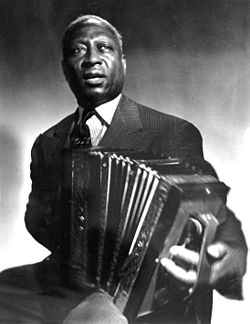Lead Belly, born Huddie William Ledbetter on January 20, 1888 in Mooringsport, Louisiana, is one of the most influential names in the history of American blues and folk music. Known for his powerful voice and skill on the twelve-string guitar, Lead Belly was also proficient in other instruments, such as the accordion, allowing him to explore a wide variety of musical styles and enrich his repertoire. His life was a constant contrast between musical success and difficult personal circumstances, including his time in prison and the success he finally achieved.
Childhood and early years
Lead Belly was born into a family of rural workers in the southern United States, a region marked by deep inequalities and racial tensions. From a young age he showed great interest in music, influenced by church songs and the work songs he heard in the cotton fields. He not only learned to play the guitar, but also the accordion, an instrument he often included in his performances, especially when performing folk music and local dance pieces. This ability set him apart from other musicians of his time and allowed him to develop a unique style.
By the age of twenty, Lead Belly was already an experienced musician, playing at local parties and bars in the area. His style began to form, combining blues, gospel, folk and the vibrant sounds of the accordion that he often used to energize crowds. It was also during these years that he had his first problems with the law, which would mark an important part of his life and career.
Confinement and redemption through music
Lead Belly's life took a drastic turn in 1918, when he was first imprisoned for murder. However, it was his music that would eventually open the prison doors for him. While incarcerated, he composed several of his best-known songs, such as "Goodnight Irene" and "Midnight Special." These songs not only gained him popularity among his fellow prisoners, but also caught the attention of important figures outside the walls.
In 1933, ethnomusicologist John Lomax and his son Alan Lomax were making recordings to preserve American folk music and visited several prisons in the southern United States. That's when they met Lead Belly, who impressed the Lomaxes with his talent. The Lomaxes recorded Lead Belly playing both guitar and accordion, and due to his efforts and popularity, he managed to have his sentence commuted. Soon after, he began to gain recognition as an authentic musician, a voice of African-American culture in a changing society.
Success in New York and the consolidation of his legacy
In 1934, Lead Belly moved to New York, where he began to gain notoriety on the folk music circuit, especially among the growing protest music movement. Thanks to his recordings with the Lomaxes, his songs began to be heard elsewhere in the United States, and his reputation as a unique singer and guitarist grew. Lead Belly also continued to play the accordion in some performances, adding a special touch to his performances and showing the versatility that characterized him.
Lead Belly had an extraordinary ability to write and reinterpret songs. Their repertoire included songs about life in the South, work songs, stories about racism, and ballads of love and loss. Among his most iconic songs are “Goodnight Irene,” “Rock Island Line,” “The Bourgeois Blues,” and “Black Betty.” These songs captured the hardships of life in the South, the injustices faced by African Americans, and the feelings of those without a voice.
His influence on modern music
Despite his personal and health problems, Lead Belly continued to perform and record until the end of his life. He died in 1949 at the age of 61 due to amyotrophic lateral sclerosis, but his legacy endures to this day. Artists such as Bob Dylan, Kurt Cobain, Led Zeppelin and many others have acknowledged Lead Belly's influence on their music. His ability to tell stories, his rough and powerful voice, and his ability to transform sadness into art continue to inspire new generations of musicians and composers.
Lead Belly was not only a blues pioneer, but also became a key figure in the development of folk music and social protest through music. At a time when African Americans had little access to the music industry, Lead Belly managed to be heard and respected, sharing his story and that of many others through his songs.
Lead Belly lived a complex and often tragic life, but his music remains a powerful voice in American culture. His ability to play multiple instruments, including the accordion, and his talent for composing memorable songs allowed him to express himself in a unique way and leave a lasting legacy. His songs, which deal with themes of injustice, love and resistance, resonated in a time of profound social change and are still relevant today. His life demonstrates the power of music to cross barriers and give a voice to those who would otherwise be ignored.
Lead Belly is remembered as one of the giants of American music, a man whose difficult life became an anthem of resistance and hope, and whose songs continue to resonate as a reminder of his legacy and indomitable spirit.
